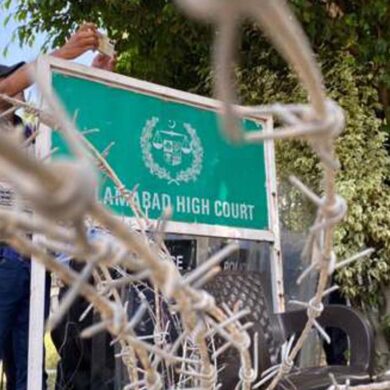Chief Justice of Pakistan Justice Qazi Faez Isa announced on Monday that October 9 would mark the final day for hearing of the petitions challenging the legislation aimed at limiting the powers of the country’s top judge.
Emphasizing the urgency of concluding the proceedings, CJP Isa stated that the hearing must be completed by 12 am on October 9.
This decision comes after the Chief Justice hinted at wrapping up the proceedings on Tuesday, citing the overwhelming number of pending cases in the apex court.
A full court bench — headed by CJP Isa and comprising 14 judges of the Supreme Court — resumed hearing on the petitions earlier in the day.
The proceedings of the case were televised by state-run PTV News.
The full court bench is headed by CJP Isa and includes Justice Sardar Tariq Masood, Justice Ijazul Ahsan, Justice Syed Mansoor Ali Shah, Justice Munib Akhtar, Justice Yahya Afridi, Justice Aminuddin Khan, Justice Sayyed Mazahar Ali Akbar Naqvi, Justice Jamal Khan Mandokhel, Justice Muhammad Ali Mazhar, Justice Ayesha A. Malik, Justice Athar Minallah, Justice Syed Hasan Azhar Rizvi, Justice Shahid Waheed and Justice Musarrat Hilali.
At the last hearing, the apex court’s full court had sought replies from all parties by September 25.
In today hearing, Chief Justice Qazi Faez Isa emphasized the significance of seeking guidance from the Quran rather than following examples set by the United States.
During the session, CJP Isa directed the lawyer representing the Pakistan Tehreek-e-Insaf (PTI), Uzair Bhandari, to read aloud the first page of the Constitution.
The Chief Justice underscored Islam’s mandate for consultations before making crucial decisions.
He pointed to Surah Aal-Imran, a chapter in the Quran, emphasizing the Islamic principle of consensus and consultation in governance matters.
Ikram Chaudhry, representing the petitioners, argued vehemently that the Supreme Court (Practice and Procedure) Act 2023 compromised the autonomy of the judiciary. CJP Isa challenged these assertions, questioning the impact of the law on the chief justice and other senior judges.
At one point, the CJP, responding to a statement by the Pakistan Tehreek-e-Insaf (PTI) lawyer Uzair Bhandari, highlighted the delicate balance between laws and rules.
When questioned about the supremacy of parliamentary laws versus rules, the Chief Justice engaged Justice Minallah in a thought-provoking exchange.
Isa pointed out that the right of appeal was not explicitly stated in Article 204, indicating that the Parliament introduced this provision through an Ordinance. He defended the concept of appeals even in high-treason cases, underlining the fundamental importance of the judicial process.
He also referenced past instances where martial law had been imposed, and expressed concerns about individuals responsible for the country’s destabilization.
He reiterated the apex court’s stance in defending the nation’s stability while emphasizing the need to respect the Parliament, even amidst the ongoing controversy surrounding the law.
The hearing has been adjourned until October 9.



